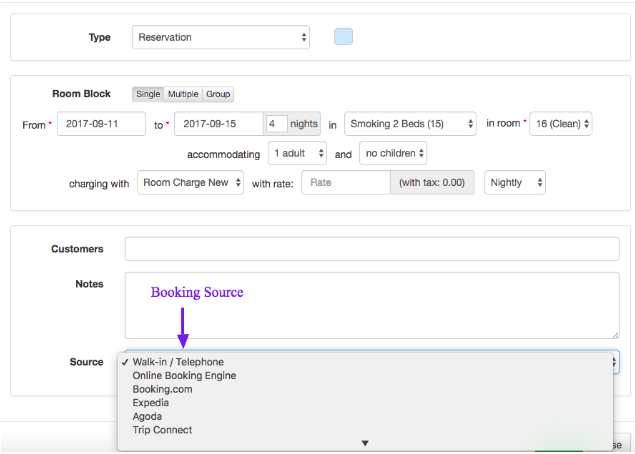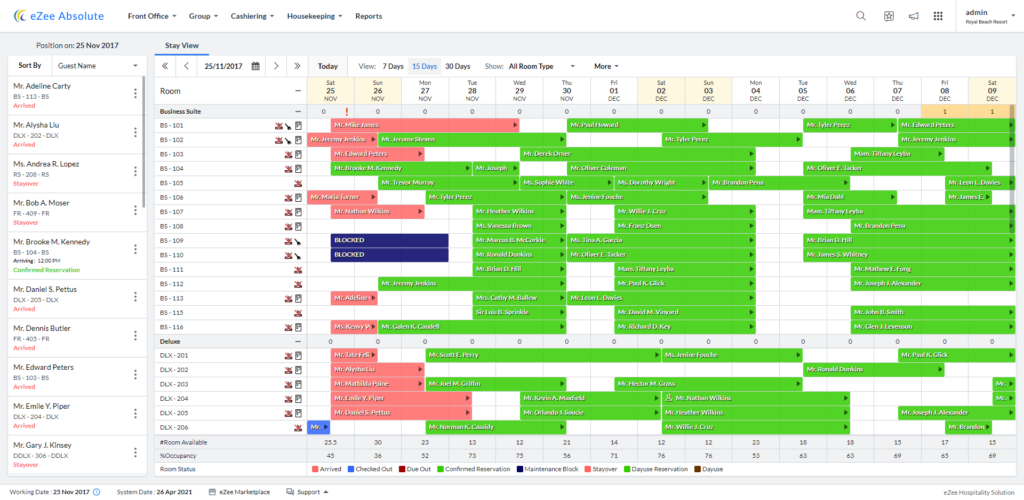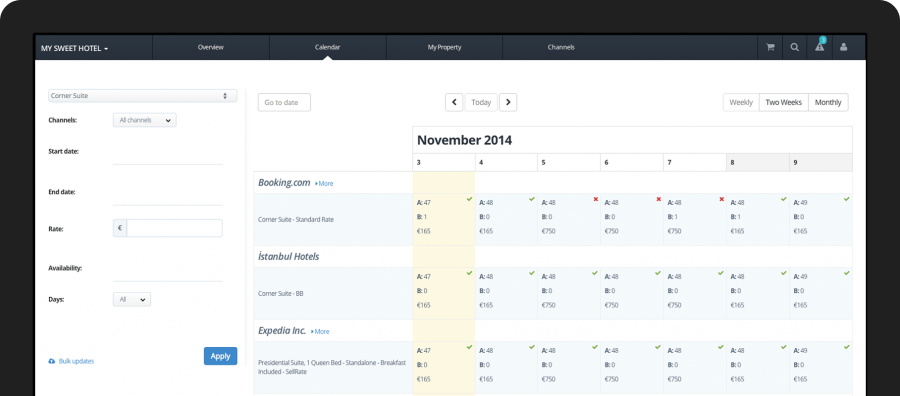12 Best Hotel Booking Software
After meticulous evaluation, I've curated a list of the 12 best hotel booking software, perfectly suited to address your challenges and fill those operational gaps. Dive in!
- Roomsy - Best for intuitive usability, simplifying complex hotel management tasks
- eZee Absolute - Best for integrated solutions, covering all hotel operation needs
- Sirvoy - Best for small to mid-sized businesses, offering cost-effective solutions
- Hotel Runner - Best for boosting direct sales with its robust booking engine
- WebRezPro - Best for seamless integration with existing hotel websites
- RMS - Best for comprehensive features with a strong emphasis on online reservations
- Checkfront - Best for accepting more bookings with its efficient reservation system
- Lodgify - Best for customizable designs, offering a unique booking experience
- RoomRaccoon - Best for automation capabilities, reducing manual workload
- Cloudbeds - Best for diverse property types, from B&Bs to hotel chains
- SiteMinder - Best for increasing global reach with its multilingual features
- innRoad - Best for independent hotel owners, offering tailored solutions
Navigating the hospitality industry requires an adept understanding of several operations like managing check-ins, room types, and payment processing - that's where hotel booking software solutions come in. I've spent considerable time immersing myself in the intricacies of software solutions that act as your online booking engine, offering modules from a hotel PMS (property management software) to a comprehensive hotel reservation system.
These tools are not just for hotels but cater to a diverse range of accommodation providers, including motels, hostels, inns, campgrounds, guesthouses, and more. A critical aspect of these tools is their API integration capabilities which ensure smooth coordination between your front office and other departments.
As someone who's grappled with the various moving parts of the hospitality industry, I know that the need of the hour is software that simplifies operations, saves time, and increases efficiency. That's what these tools do. They streamline your booking processes, automate repetitive tasks, and give you more time to focus on delivering great guest experiences.
The pain points they address include overbookings, manual errors, and the time-consuming nature of administrative tasks, among others. I've curated a list of these tools to help you find the one that fits your specific needs best.
What is a Hotel Booking Software?
Hotel booking software serves as a powerful tool used predominantly by hoteliers, hospitality management professionals, and even independent vacation rental owners. This technological solution streamlines the reservation process, optimizes room occupancy rates, and enhances overall operational efficiency.
With a myriad of features, including online booking management, real-time inventory updates, customer data handling, and integrated payment gateways, hotel reservation software fosters seamless interactions between hotels and their guests. By automating complex tasks, these tools pave the way for improved customer satisfaction, increased direct bookings, and, ultimately, a boosted bottom line.
12 Best Hotel Booking Software Overview
1. Roomsy - Best for intuitive usability, simplifying complex hotel management tasks

Roomsy is an efficient hotel management platform known for its simplicity and intuitive usability. It aims to make complex hotel management tasks straightforward, reducing time and effort for users.
Why I Picked Roomsy:
In my assessment, Roomsy stood out because of its user-friendly interface and ability to simplify complex tasks. I chose it because it streamlines the hotel management process, making it an excellent pick for those who appreciate simplicity and efficiency. It is best for reducing complexity thanks to its easy-to-use design and smart features, which cut down on time spent navigating and operating the system.
Standout features & integrations:
Roomsy brings a range of helpful features to the table, like room and rate management, online booking, and comprehensive reports. These features work together to reduce the complexities of managing a hotel. It also integrates seamlessly with a number of third-party platforms, including popular payment gateways, revenue management systems, and keyless entry solutions.
Pricing:
From $70/user/month (billed annually)
- Access to all features
- Customer support
- Free updates
Pros:
- Intuitive and user-friendly interface
- Comprehensive reporting capabilities
- Seamless third-party integrations
Cons:
- Pricing may be high for small establishments
- Lacks a native mobile app
- Limited customization options
2. eZee Absolute - Best for integrated solutions, covering all hotel operation needs

eZee Absolute is a cloud-based hotel management system designed to offer a comprehensive suite of services. It targets all aspects of hotel operations, hence providing an integrated solution for businesses.
Why I Picked eZee Absolute:
I picked eZee Absolute due to its extensive features and comprehensive nature. This tool stands out as it covers all aspects of hotel management in a singular platform. It's best for offering integrated solutions, as it provides a one-stop solution for all hotel operation needs, saving time, and effort, and ensuring consistency across all tasks.
Standout features & integrations:
eZee Absolute comes with an array of powerful features, including online booking, front desk operations, housekeeping, and revenue management. Furthermore, it integrates with numerous third-party platforms such as OTAs, GDS, meta-search engines, and more, facilitating a connected operational environment.
Pricing:
From $50/user/month
- Complete access to all features
- 24/7 live support
- Free software updates
Pros:
- Comprehensive suite of services
- Extensive third-party integrations
- 24/7 support
Cons:
- Interface can be overwhelming for new users
- Limited customization options
- Pricing can be steep for small businesses
3. Sirvoy - Best for small to mid-sized businesses, offering cost-effective solutions

Sirvoy is a robust hotel management tool designed to streamline operations for small to mid-sized businesses. It does this by offering a comprehensive yet cost-effective solution to meet their unique needs.
Why I Picked Sirvoy:
Sirvoy made it to my list due to its affordable price point and comprehensive features suitable for smaller businesses. Its edge lies in providing an all-inclusive, budget-friendly tool without compromising on essential features, making it best for small to mid-sized establishments looking for cost-effective solutions.
Standout features & integrations:
Sirvoy's notable features include an intuitive booking engine, reservation management, invoicing capabilities, and multilingual support. It also integrates with an array of third-party platforms, including popular payment systems, channel managers, and customer relationship management tools, enhancing its functionality for users.
Pricing:
From $15/user/month
- Full access to features
- No setup fees
- Free software updates
Pros:
- Affordable for small to mid-sized businesses
- Multilingual support for global operations
- Variety of integrations
Cons:
- Interface may seem dated compared to newer platforms
- Limited advanced features
- Customer support could be improved
4. Hotel Runner - Best for boosting direct sales with its robust booking engine

Hotel Runner is an innovative hotel management tool, specifically designed to enhance direct sales through a powerful booking engine. With its efficient functionalities, it caters to properties of all sizes aiming to improve their direct booking rates.
Why I Picked Hotel Runner:
Hotel Runner earned its spot on this list due to its unique focus on direct sales optimization. Unlike much other software, it specifically tailors its booking engine to drive direct reservations, making it the best choice for establishments looking to reduce reliance on OTAs and boost their direct sales.
Standout features & integrations:
Hotel Runner offers an advanced booking engine, a channel manager, and a dynamic pricing tool. It also provides a unique ‘Promotion Engine’ to run specific deals and discounts. The platform integrates seamlessly with various third-party applications, including payment gateways, revenue management tools, and guest communication systems.
Pricing:
From $9.99/user/month (billed annually)
- All-inclusive features access
- 24/7 customer support
- Free setup and updates
Pros:
- Effective direct sales enhancement
- Includes a unique promotion engine
- Wide range of integrations
Cons:
- Yearly billing might not suit all businesses
- Steeper learning curve for new users
- Limited customization options
5. WebRezPro - Best for seamless integration with existing hotel websites

WebRezPro is a property management system offering complete operational functionality. The system's primary strength lies in its capacity for smooth integration with existing hotel websites, providing a vital tool for businesses in need of a solution that works well with their current digital infrastructure.
Why I Picked WebRezPro:
When selecting the most effective tools, WebRezPro stood out for its integration capability. I believe it's "best for smooth integration with existing hotel websites" because its comprehensive and adaptable functionality complements rather than disrupts the existing digital infrastructure.
Standout features & integrations:
WebRezPro offers essential features such as online booking, inventory management, and reporting. These features are designed to optimize the management process and improve overall operational efficiency. It also integrates effectively with various third-party systems like OTAs, payment gateways, POS systems, and accounting software.
Pricing:
From $5/user/month (billed annually)
- Full access to WebRezPro's features
- Unlimited training and support
Pros:
- Smooth integration with existing websites
- Comprehensive set of features
- Affordable pricing
Cons:
- Annual billing might be inconvenient for some
- Requires some technical knowledge for full utilization
- Might offer more features than needed for small businesses
6. RMS - Best for comprehensive features with a strong emphasis on online reservations

RMS is a well-rounded hotel management software that focuses heavily on online reservations. The software covers a broad array of hotel operations, with particular strength in managing, tracking, and optimizing online reservations.
Why I Picked RMS:
I selected RMS due to its impressive array of features that not only support typical hotel operations but excel in online reservations management. RMS stood out from the rest with its extensive functionalities, making it best for those who want a thorough tool that emphasizes online booking capabilities.
Standout features & integrations:
RMS provides a vast array of features, including online booking management, channel manager, guest communication, and housekeeping scheduling. The software integrates well with major OTAs, payment gateways, and various third-party systems such as CRM and guest review platforms.
Pricing:
From $45/user/month
- All-in-one platform access
- Ongoing support and updates
- Training resources available
Pros:
- Strong focus on online reservations
- Comprehensive feature set
- Wide range of integrations
Cons:
- Higher starting price
- May be overwhelming for small hotels
- Limited customization options
7. Checkfront - Best for accepting more bookings with its efficient reservation system

Checkfront offers a streamlined approach to hotel management with a strong focus on improving the reservation process. It provides comprehensive tools that facilitate more bookings, making it a highly effective solution for hotels looking to optimize their booking process.
Why I Picked Checkfront:
I picked Checkfront because of its exceptional reservation management capabilities. When comparing and judging various tools, Checkfront's efficiency in managing and processing reservations sets it apart, making it best for those who seek to increase the booking acceptance rate.
Standout features & integrations:
Checkfront's most useful features include its robust online booking system, reservation management, invoicing, and real-time reporting. It offers significant integrations with major online travel agencies (OTAs), payment gateways, and popular CRM systems.
Pricing:
From $49/user/month (billed annually)
- Access to all features
- Unlimited bookings
- Includes setup and training
Pros:
- Efficient reservation system
- Comprehensive feature set
- Wide range of integrations
Cons:
- Higher starting price
- Annual billing
- May be complex for beginners
8. Lodgify - Best for customizable designs, offering a unique booking experience
Lodgify provides vacation rental software that allows for high levels of customization in the booking process. Its ability to create a unique and tailored booking experience aligns it with the needs of businesses striving for a distinctive identity.
Why I Picked Lodgify:
In determining the best tools, I chose Lodgify for its strong customization options, which significantly differentiate it from other similar tools. I believe it's best for offering a unique booking experience, as it allows businesses to shape the booking process to align with their specific brand or identity.
Standout features & integrations:
Lodgify's features emphasize customization and efficiency. Its reservation system, website builder, and channel manager are all designed to be fully customizable. Moreover, Lodgify offers integrations with various payment gateways, website analytics tools, and top OTAs.
Pricing:
From $23/user/month (billed annually)
- Unlimited reservations
- Access to all features
- Includes support and training
Pros:
- High customization options
- Integration with major platforms
- Affordable starting price
Cons:
- Annual billing
- Might be too complex for those seeking simplicity
- Some features may be unnecessary for smaller operations
9. RoomRaccoon - Best for automation capabilities, reducing manual workload

RoomRaccoon is a hotel management software that enables hoteliers to streamline and automate their everyday tasks. Its prime asset is its potent automation capabilities, making it an excellent tool for those wanting to minimize manual workload in their hospitality businesses.
Why I Picked RoomRaccoon:
In making my selection, RoomRaccoon emerged as a clear choice due to its superior automation capabilities. I believe it is the "Best for automation capabilities, reducing manual workload," as it effectively automates various tasks such as booking, billing, and room allocation, saving hoteliers a considerable amount of time.
Standout features & integrations:
Among RoomRaccoon's key features are automated invoicing, a centralized reservation system, and dynamic pricing. These features help to streamline the management of bookings and finances while optimizing revenue. The software integrates well with a variety of systems, such as payment processors, booking channels, and other hotel technology solutions.
Pricing:
Starting at $99/user/month (billed annually)
- Access to RoomRaccoon's full suite of features
- Includes ongoing support and training
Pros:
- Robust automation capabilities
- Centralized reservation system
- Dynamic pricing feature
Cons:
- May be expensive for small businesses
- Annual billing may not be suitable for all
- Might have a steeper learning curve for those not tech-savvy
10. Cloudbeds - Best for diverse property types, from B&Bs to hotel chains

Cloudbeds is a robust property management system designed to simplify and optimize operations for various types of accommodations. Given its versatility, it suits a broad range of property types, from B&Bs to hotel chains, making it a practical choice for diverse hospitality businesses.
Why I Picked Cloudbeds:
I chose Cloudbeds for its impressive adaptability to different accommodation types. Its flexibility is a significant determinant for its selection, making it stand out amongst the competition. I deem Cloudbeds as "Best for diverse property types, from B&Bs to hotel chains" due to their ability to cater to a wide variety of property styles.
Standout features & integrations:
Cloudbeds offers a comprehensive set of features like reservation management, revenue management, and reporting tools that can be tailored to suit different accommodation types. It integrates seamlessly with various third-party platforms such as Booking.com, Expedia, and TripAdvisor, facilitating better exposure and occupancy rates.
Pricing:
Starting from $200/user/month
- Includes full access to Cloudbeds' suite of features
- Customizable according to your property type and size
Pros:
- Accommodates a wide range of property types
- Comprehensive set of features
- Integrates with many third-party platforms
Cons:
- Might be pricey for small properties
- Customization may require a learning curve
- Limited offline capabilities
11. SiteMinder - Best for increasing global reach with its multilingual features

SiteMinder is a comprehensive hotel management software, that provides a complete solution for managing online marketing, sales, and operations. Its powerful multilingual capabilities stand out, offering the potential for expanding global reach and catering to the needs of diverse customer demographics worldwide.
Why I Picked SiteMinder:
In choosing SiteMinder, its unique capacity for multilingual functionality was the defining factor. It distinguishes itself with this inclusivity feature, enabling businesses to appeal to an international audience. Thus, I selected SiteMinder as "Best for increasing global reach with its multilingual features" due to its effective facilitation of global operations.
Standout features & integrations:
SiteMinder's key features include an intuitive reservation system, integrated channel management, and robust reporting capabilities. Furthermore, the multilingual feature offers translations in over 20 languages. It integrates well with popular OTAs and GDS systems, providing extensive visibility across multiple booking channels.
Pricing:
From $40/user/month (billed annually)
- This covers access to all SiteMinder's essential features and support.
Pros:
- Extensive multilingual features
- Integrated channel management
- Robust reporting capabilities
Cons:
- Annual billing may not suit all businesses
- Limited customization options
- The user interface might be complex for beginners
12. innRoad - Best for independent hotel owners, offering tailored solutions

innRoad is a cloud-based property management system designed to meet the unique needs of independent hotels. It provides a comprehensive suite of features, including reservation management, billing, and reporting, with a focus on offering tailored solutions for independent hotel owners.
Why I Picked innRoad:
innRoad stood out to me because of its dedication to independent hotel owners. After comparing its features with other tools, it became clear that innRoad provides tailored solutions that cater specifically to the needs of independent properties. I thus judged innRoad as the "Best for independent hotel owners, offering tailored solutions" due to its commitment to this specific niche.
Standout features & integrations:
innRoad provides robust features such as an intuitive booking engine, efficient front desk management, and detailed reporting capabilities. Additionally, its integration capability with major OTAs and GDSs enhances visibility and booking opportunities for independent hotels.
Pricing:
From $200/user/month (billed annually)
- This pricing provides access to all basic features, including support.
Pros:
- Dedicated solutions for independent hotels
- Intuitive booking engine
- Efficient front desk management
Cons:
- Pricing may be high for smaller establishments
- User interface might require some learning
- Limited customizability options
Other Hotel Booking Software
Below is a list of additional hotel booking tools that we shortlisted but did not make it to the top 12. Definitely worth checking them out.
- GuestRez - Good for optimizing operations with its all-in-one hospitality management system
- Frontdesk Anywhere - Good for comprehensive property management, including inventory and rate management
- Seven Rooms - Good for restaurants and hotels needing reservation and guest experience platform
- Operto - Good for enhancing the guest experience with smart home automation for hotels
- Hotello - Good for seamless integration of PMS, POS, and CRM in a single software
- Little Hotelier - Good for small hotels and B&Bs looking for a simplified booking engine
Selection Criteria for Hotel Booking Software
In my extensive research and personal experience with a multitude of hotel booking software, I've found certain key criteria that stand out when it comes to choosing the best. I've evaluated dozens of hotel booking tools, and these have been the ones that truly stood out, primarily for their specific functionalities, which I'll go into more detail about below.
Core Functionality:
- Reservation Management: Ability to track, manage, and modify reservations efficiently.
- Inventory Management: Tools to manage room availability in real time to prevent overbooking.
- Rate Management: Option to vary pricing based on factors like season, demand, and type of room.
- Guest Communication: Automated and personalized communication with guests before, during, and after their stay.
Key Features:
- Integration: Compatibility with other software in use, like CRM, POS, or accounting software.
- Reporting and Analytics: Detailed reports about occupancy, revenue, guest preferences, etc.
- Mobile Access: A mobile app or mobile-friendly interface to manage operations from anywhere.
- Multilingual and Multi-Currency Support: Essential for hotels serving an international clientele.
Usability:
- Intuitive Interface: A clear, logical layout that reduces the learning curve for staff and increases operational efficiency. In this case, features like a color-coded booking chart, drag-and-drop functionality for managing bookings, and easy navigation are important.
- Role-Based Access: An employee management feature that enables easy configuration of user access based on job roles. This is crucial for larger establishments with numerous employees across different departments.
- Customer Support: Robust support system, including detailed guides, video tutorials, a well-organized knowledge base, live chat, or 24/7 phone support. Especially for complex enterprise solutions, some kind of training program for onboarding users is desirable.
- Quick Onboarding: Ability to swiftly and seamlessly set up the software, migrate data from previous systems if needed, and start operating. For this category of software, a walk-through setup guide or an optional setup consultation is valuable.
People Also Ask
What are the benefits of using hotel booking software?
Hotel booking software offers numerous advantages, including:
- Efficiency: It automates many administrative tasks, freeing up staff to focus on guest services and other critical operational tasks.
- Accuracy: By managing reservations in real-time, it prevents overbooking and other booking errors.
- Revenue Management: It allows dynamic pricing based on various factors, enabling optimized revenue generation.
- Insight: Through detailed reports and analytics, it provides valuable insights into business performance and guest behavior.
- Accessibility: It enables easy management of operations from anywhere, anytime, particularly through mobile access.
How much does hotel booking software cost?
The cost of hotel booking software varies significantly depending on the complexity of features, the property's size, and the software provider's pricing model. Some providers charge a flat monthly or yearly fee, while others base their pricing on the number of rooms or users. Additional costs might include setup fees, integration charges, or premium support fees.
What is the typical range of pricing for hotel booking software?
Prices for hotel booking software can range from as low as $5 per room per month to upwards of $100 per user per month for premium options with advanced features. This range reflects the diversity of hotel booking software options available, each with its own unique set of capabilities and value propositions.
What are the cheapest and most expensive hotel booking software options?
Little Hotelier starts from $99 per month and is among the more affordable options. On the other hand, software like innRoad starts from around $200 per month and can go up based on the number of rooms and features required.
Are there any free hotel booking software options?
There are a few free options available, but they tend to be very limited in functionality and might not be suitable for most hotels. These include options like KWHotel Free, but it's important to note that you may quickly outgrow the capabilities of a free tool, making a paid solution inevitable for sustainable growth and operations.
Summary
To summarize, selecting the best hotel booking software involves careful consideration of several key factors, including the specific needs of your property, the range of functionalities the software offers, and the pricing model that fits within your budget. All the software options listed in this guide offer unique advantages and are worth considering based on your specific requirements.
Here are three key takeaways:
- Align Software with Specific Needs: Your choice should align with your hotel’s specific needs. If you own a small boutique hotel, simple, user-friendly software like Little Hotelier might be more suitable. For larger hotel chains requiring extensive automation and integration capabilities, solutions like RoomRaccoon or Cloudbeds could be more appropriate.
- Prioritize Essential Features: Identify the most crucial features you need and ensure your chosen software provides them. Common essential features include real-time inventory management, third-party integrations, dynamic pricing, and detailed reporting.
- Consider Total Cost: While it might be tempting to opt for the cheapest option, consider the total cost, including any additional fees for setup, integrations, or premium support. Remember that a slightly higher upfront cost could provide more value in the long run through increased efficiency and revenue.
What do you think?
We hope this guide has been helpful in your search for the perfect hotel booking software. However, we understand that the hotel industry is diverse and constantly evolving, so there might be other fantastic solutions we've missed.
If you've come across or are using a tool that you think should be on this list, please let us know. We value your insights and are always looking to update our resources to provide the most accurate and helpful information to our readers.

